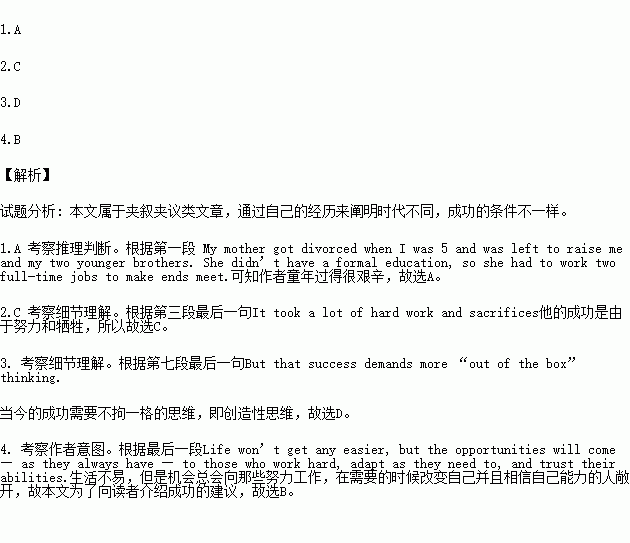题目内容
My mother got divorced when I was 5 and was left to raise me and my two younger brothers. She didn’t have a formal education, so she had to work two full-time jobs to make ends meet.
One day several years later, I was determined to help. I told the manager of the Don Carlos Motel in Nana Point that I was 15, so I could get a work permit to work as a maid.
Since then, I’ve started to work alongside some of America’s top leaders, written books, and achieved financial independence. It took a lot of hard work and sacrifices.
But what if I was 15 years old today? Would I be able to accomplish the same things in this new, highly competitive world with so many global challenges? It seems hard work and sacrifices aren’t enough anymore.
Today, you need to be extremely adaptable. To progress in your career, it’s not enough to know one thing well. As my friend Sean Harvey, product manager at Google put it when we were speaking to students, “Today, companies aren’t hiring people for a specific position but rather people who are smart and flexible. The way you prove that is by showing you can do multiple things well.”
People need to take more risks to succeed now than ever. The combination of unemployment and slow wage growth means that we are not only at greater financial risk, but we have to take more risks to succeed.
Luckily, the new Internet world of all-the-time connectedness means that anyone with a hot idea, product or service can create a business out of almost nothing. And success can be quick and big. But that success demands more “out of the box” thinking.
And what about our kids? It makes me think a lot about the future that my 3-years-old daughter faces. But no matter what the future brings, I think the best message I’ll give her is to believe in herself. Life won’t get any easier, but the opportunities will come — as they always have — to those who work hard, adapt as they need to, and trust their abilities.
1.We can infer that the author had _________.
A. a difficult childhood B. a lonely childhood
C. a normal childhood D. a happy childhood
2.The author achieved financial independence when she was 15 largely due to ______.
A. her strong leadership
B. her boss’s help
C. her hard work
D. her competitive spirit
3. Compared to the past, people who want to succeed now need __________.
A. more time B. more money
C. to work harder D. to be more creative
4. The author writes the text mainly to __________.
A. describe her childhood
B. give some suggestions about success
C. tell a story about her mother
D. share some useful parenting skills

